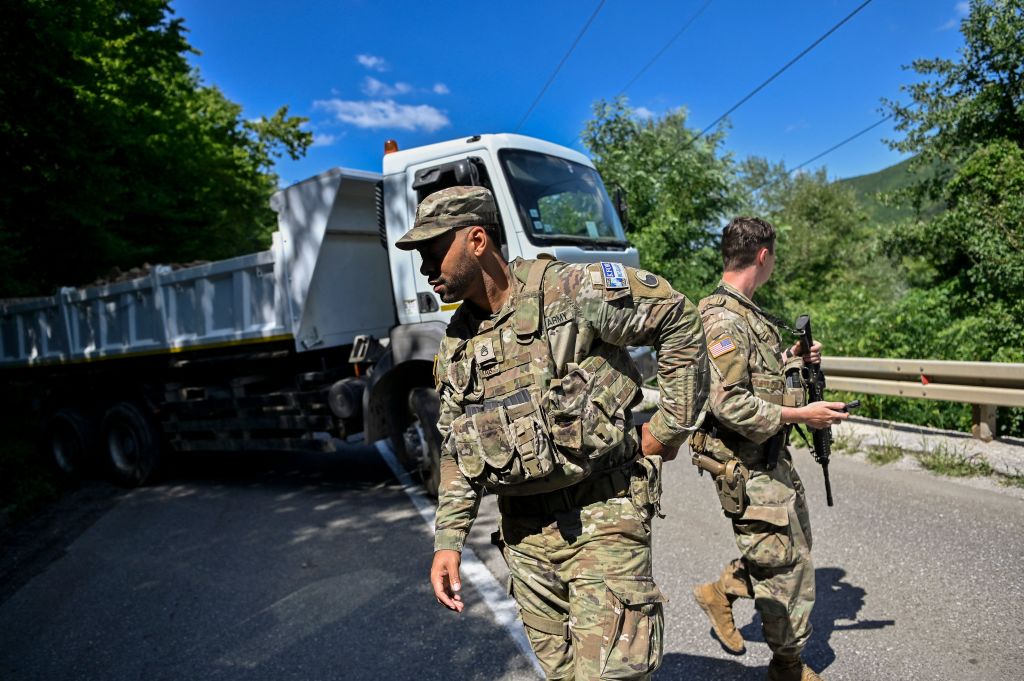
A Kosovo government measure set to take effect on Monday would have required Serbs living in northern Kosovo to apply for local license plates, replacing their Serbian ones. But ahead of its implementation, protests and gunfire broke out on Sunday evening—pushing Kosovo authorities to delay the measure. (Serbia has long had a similar rule for Kosovars.)
The flare-up has since quieted, with NATO-led peacekeepers removing roadblocks set up by Serbian protesters. But it’s a reminder of longstanding tensions between the two countries. Kosovo and Serbia fought a bloody war between 1998-1999, which saw Serbian forces under Yugoslav President Slobodan Milošević commit war crimes against largely Muslim ethnic Albanians who form the majority of Kosovo’s population, drawing international condemnation. U.S.-backed NATO forces launched an aerial bombing campaign against Serbian military targets between March-June 1999.
Since June 1999, NATO has led a peacekeeping operation in Kosovo. Some 3,700 troops remain in the country today.
Although the Western-backed Kosovo government declared independence in February 2008, Serbia has blocked its efforts to join the U.N. More than 100 countries have recognized Kosovo.
The latest dispute suggests that a resolution between the two countries is no closer in sight. “We are more than 20 years past the end of the war but are still nowhere near a lasting settlement between Serbia and Kosovo,” says Jacques Rupnik, a professor at Sciences Po in Paris.
The latest flashpoint was triggered in part by a new, emboldened government in Pristina, Kosovo’s capital. “Prime Minister Albin Kurti is adamant about restoring sovereignty—not just by declaration but also in fact. This license plate issue is about state sovereignty… he has no problem getting confrontational,” says Rupnik.
“The following hours, days and weeks may be challenging and problematic,” Kurti said in a video address on Sunday.
Kurti also said in a press release on Sunday that the government promised to delay the implementation of decisions related to car plates and entry-exit documents at border crossing points with Serbia for 30 days as long as “all barricades are removed and complete freedom of movement is restored on all roads in the north of Kosovo.”
There are some 50,000 ethnic Serbs in northern Kosovo who do not recognize the Kosovo government.
Kurti said the obstruction of roads and gunfire “has everything to do with a tendency to destabilize Kosovo and to threaten the peace and security of our citizens and country,” blaming Belgrade authorities for “multiple aggressive acts.”
NATO’s U.N.’s-mandated peace-keeping force had described the security situation in the northern areas of Kosovo as “tense” in a press release issued on Sunday.
Sciences Po’s Rupnik says that the “summer flare up” is “unpleasant and reveals that the situation remains unsettled but nobody considers this a major risk.” He adds: “Things can get out of hand without either side having planned it but there’s no interest in either side on escalating the conflict.”
But even though neither Kosovo nor Serbia has an interest in a violent escalation, it’s not out of the question for developments to spiral out of control, says Danilo Mandić, associate senior lecturer in Harvard University’s sociology department.
“Both Belgrade and Pristina have engaged in a kind of ethno-nationalist baiting, which means they bait the other side to have these mini incidents, which fall short of full scale violence but are disruptive,” Mandić says. “The trouble is that they’re playing with fire; once you play with fire like this, things get out of hand… and people are on edge.”
“This is a normal continuation of a separatist standoff between the Republic of Serbia and the Kosovo administration,” Mandić adds.
Any lasting solution to Kosovo-Serbia tensions would likely need to happen through the E.U. process in which the institution is deeply engaged and will also need U.S. involvement, experts say. “In the process of Kosovo-Serbia dialogue, there has been a lack of political spine from transatlantic partners like the E.U. and the U.S.,” says Engjellushe Morina, a senior policy fellow at the European Council on Foreign Relations.
The E.U. has previously affirmed that the future of the Western Balkans is in the E.U. and has mediated negotiations between Serbia and Kosovo over the last decade. “Somehow they dropped the ball and if you don’t remain engaged, you leave it to the local politicians who have their own agendas and the nationalist agenda can prevail,” Rupnik says.
More Must-Reads from TIME
- Cybersecurity Experts Are Sounding the Alarm on DOGE
- Meet the 2025 Women of the Year
- The Harsh Truth About Disability Inclusion
- Why Do More Young Adults Have Cancer?
- Colman Domingo Leads With Radical Love
- How to Get Better at Doing Things Alone
- Michelle Zauner Stares Down the Darkness
Write to Sanya Mansoor at sanya.mansoor@time.com